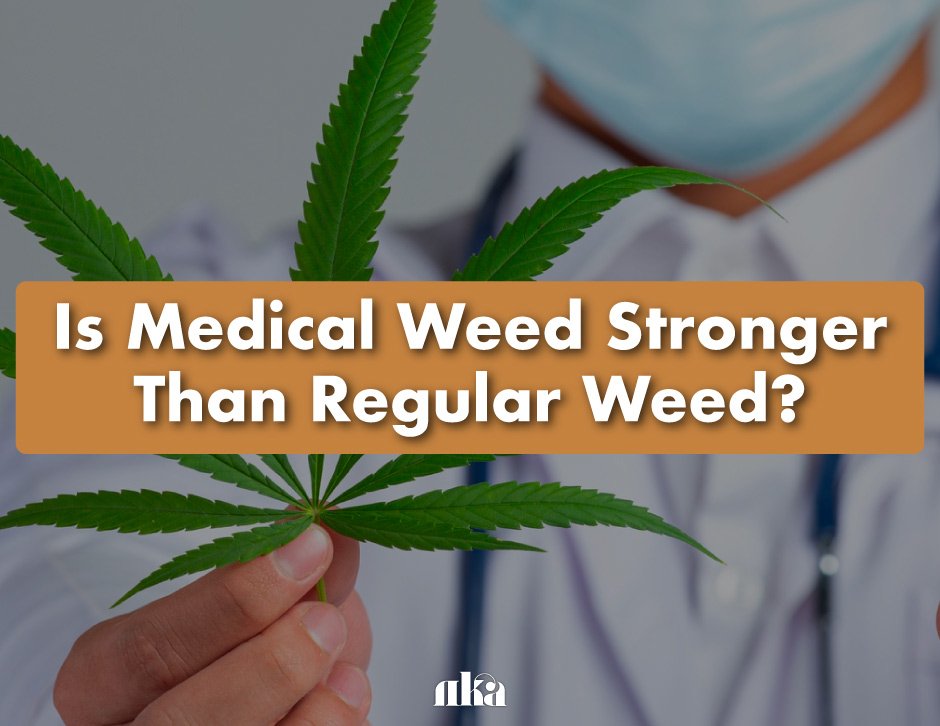Is Medical Weed Stronger Than Regular Weed?
Is medical weed stronger than regular weed? Medical marijuana (often referred to as medical weed) and recreational marijuana (known colloquially as regular weed) are two common terms used to describe cannabis and its related products. The differentiation primarily lies in the purpose of use rather than the plant itself.
Medical marijuana refers to the use of cannabis to treat certain medical conditions, symptoms, or ailments. A doctor usually prescribes it to you, and there might be more rules to follow. Additionally, to obtain it, you must bring a specific card with you to the dispensary. The strains and products designated as "medical" might be chosen for their particular cannabinoid profiles to treat specific conditions.
Recreational marijuana, on the other hand, is cannabis used primarily for recreational or non-medical purposes. It's consumed to achieve a "high," or the psychoactive effects of the plant. Its availability and regulations vary by country or state.
In this article, we will answer the question, “Is Medical Weed Stronger Than Regular Weed?” and discuss the various factors that contribute to the potency and effectiveness of both.
The Potency Debate: Medical Marijuana vs. Regular Marijuana
The belief that medical cannabis is stronger than regular weed likely stems from the idea that patients require a more concentrated or potent product to address their medical conditions. The medical context itself might suggest that these products are 'pharmaceutical-grade,' implying a higher level of potency or purity. Additionally, anecdotal reports from users who’ve experienced strong effects from medical cannabis products further fuel this belief.
However, it's crucial to note that medical cannabis isn't universally more potent. Instead, it's tailored to the specific needs of patients, which can range from high THC or CBD levels to a balanced ratio, depending on the medical condition being addressed.
Below, we discuss some of them:
Strain: Different cannabis strains have varied levels of THC, CBD, and other cannabinoids. Some are naturally more potent than others. For example, Indica strains are often associated with stronger body highs and sedative effects, while Sativa strains might offer more cerebral, uplifting effects.
Cultivation: Growing conditions like light, nutrients, and care can impact the potency of the cannabis plant. Professional growers might optimize these factors for maximum potency.
Processing: How the cannabis is processed after harvesting can also influence its potency. For instance, concentrates and extracts can have significantly higher THC levels than raw flowers.
Understanding THC and CBD Levels ( THC Levels In Medical vs. Recreational)
Cannabis, a versatile and complex plant, contains over a hundred different compounds known as cannabinoids. Among these, THC (tetrahydrocannabinol) and CBD (cannabidiol) are the most recognized and studied.
THC is the primary psychoactive compound in cannabis. It's responsible for producing the "high" that many users associate with marijuana. When consumed, THC interacts with the endocannabinoid system in the brain, leading to alterations in mood, perception, cognition, and motor function.
Unlike THC, CBD does not produce a psychoactive high. Instead, it has garnered attention for its potential therapeutic benefits, including anti-inflammatory, anti-anxiety, antipsychotic, and anticonvulsant properties. CBD can also modulate the effects of THC, often tempering its psychoactivity.
Strains with high THC and low CBD produce strong psychoactive effects and can induce euphoria but might trigger anxiety in some users. Strains with a balanced THC-to-CBD offer a moderated, smoother, high-blending psychoactivity with therapeutic benefits. In contrast, high CBD and low THC strains primarily focus on therapeutic effects, aiding conditions like anxiety and pain without inducing a pronounced high.
Medical Weed: Tailored Potency for Patients
Potency customization in medical cannabis is crucial because patients use it as a therapeutic agent. Unlike recreational users who might seek a "high," medical users require specific cannabinoid profiles to address their medical conditions without undesirable side effects.
Medical cannabis may be crafted to provide relief from specific symptoms or treat certain conditions. This is why growers and researchers work together to develop strains with particular cannabinoid ratios, terpene profiles, and other attributes that offer the desired therapeutic benefits. This can include enhancing certain effects or mitigating potential adverse reactions.
The therapeutic effects of THC can benefit various medical conditions, while in other cases, lower THC levels might be preferred to avoid strong psychoactive effects.
Conditions Benefiting from Higher THC Levels:
Chronic Pain: THC can act as a powerful analgesic, helping to reduce pain perception in conditions like arthritis, neuropathy, and migraines.
Insomnia: THC often has sedative effects, making it useful for those who have difficulty sleeping.
Nausea and Vomiting: Especially common in chemotherapy patients, THC can help suppress nausea and stimulate appetite.
Multiple Sclerosis: THC can help reduce muscle spasticity and pain associated with MS.
Appetite Stimulation: THC can be beneficial for patients with conditions causing appetite loss, such as HIV/AIDS or certain cancers.
Conditions Benefiting from Lower THC Levels (or Higher CBD Levels):
Anxiety Disorders: High doses of THC can exacerbate anxiety in some individuals. Lower THC or CBD-dominant strains can offer relief without heightening anxiety.
Epilepsy: CBD has been found effective in reducing seizure frequency, especially in forms like Dravet syndrome and Lennox-Gastaut syndrome. Lower THC is preferred to avoid psychoactive effects in these patients.
Inflammation: CBD possesses anti-inflammatory properties, making it suitable for conditions like inflammatory bowel disease.
Psychotic Disorders: High THC might exacerbate symptoms in individuals with schizophrenia or other psychotic disorders. CBD has antipsychotic properties and can be more suitable.
Neurodegenerative Disorders: CBD has shown neuroprotective effects, which can be beneficial for conditions like Parkinson's and Alzheimer's.
Medical patients often choose strains that align with their specific therapeutic needs.
Pain Management: Patients might opt for strains high in THC due to its analgesic properties.
Anxiety Relief: A strain high in CBD and low in THC can be preferable as it provides relaxation without intensifying anxiety.
Seizure Control: High CBD strains are often chosen, especially after the recognition of CBD's efficacy in certain forms of epilepsy.
Mood Regulation: Patients with conditions like depression might seek balanced THC/CBD strains or strains rich in uplifting terpenes.
It's crucial for patients to work closely with their healthcare provider to pinpoint strains that might be most beneficial, considering factors like the condition being treated, the patient's cannabinoid tolerance, and potential side effects.
Strain Selection in Medical Cannabis
Several strains are favored in the medical community due to their specific cannabinoid profiles:
Purple Runtz: Recognized for its vibrant appearance and fruity aroma, this strain is a blend of both indica and sativa effects. It provides a balanced high that may help alleviate stress, anxiety, and chronic pain, making it favored by many patients.
Rainbow Belt: A colorful strain with a varied terpene profile, Rainbow Belt is renowned for its mood-elevating properties. Its balanced THC:CBD ratio may make it suitable for both pain relief and relaxation without being overly sedative.
Skywalker: With its dominant indica lineage, Skywalker is praised for its deeply relaxing and calming effects. This strain may help patients suffering from insomnia, chronic pain, and anxiety, often providing them with a serene sense of well-being.
Regular Weed: The Recreational Experience
For many recreational users, cannabis consumption is akin to enjoying fine wine or gourmet food, it's not solely about the effect but the journey to get there. This journey can encompass the ritual of preparation, the tactile feel of the bud, the visual aesthetics, and even the camaraderie of shared consumption.
While potency and the resultant psychoactive effects are undoubtedly significant for recreational users, many also prioritize other aspects of their cannabis. Terpenes, aromatic compounds in cannabis, play a pivotal role here. They give strains their unique scents and flavors, ranging from citrusy and fruity to earthy and skunky. For some enthusiasts, savoring the rich tapestry of flavors and aromas is as rewarding as the high itself.
Variability Within Both Categories
The world of cannabis, spanning both medical and recreational domains, boasts a wide range of strains varying in potency. This diversity contradicts the prevalent notion that medical cannabis is always high-potency, while recreational cannabis is purely for the high.
Two primary factors influence this variability: cultivation methods and genetics. Different growing conditions, like light exposure and soil quality, can alter the cannabinoid profiles of a strain. Similarly, genetic variations within the same strain can produce differences in potency due to unique genetic makeups.
Debunking the Myths: Is Medical Weed Stronger Than Regular Weed?
It's a widespread myth that medical weed is universally stronger than its recreational counterpart. This misconception likely originates from the assumption that patients need highly potent cannabis to treat serious ailments. However, this isn't necessarily the case.
One Size Fits All: Some people assume that all medical patients require highly potent cannabis. In reality, different ailments require different cannabinoid profiles. For some conditions, a balanced or even CBD-dominant strain might be more beneficial than a high-THC one.
Medical Equals High THC: Not all medical cannabis is high in THC. Many medical strains prioritize CBD or other cannabinoids, especially when treating conditions where psychoactive effects might be undesirable.
Recreational Always Means Lighter: Recreational users aren't always seeking milder effects. In fact, some recreational strains boast very high THC concentrations for those seeking a potent experience.
It is important to note that the "strength" of cannabis isn't just about its THC content. It's about how a particular strain or product aligns with an individual's needs or desired effects. Some people might judge how effective a strain is at relieving pain without making them feel tired. For others, strength might be about achieving a deep state of relaxation or euphoria. Thus, what one person considers strong, another might deem mild based on their unique experiences and needs.
The Role of Responsible Use
Regardless of whether one is consuming cannabis for medical or recreational reasons, responsible use is paramount. This involves understanding the effects, being aware of personal limits, and ensuring one's consumption doesn't negatively impact daily life or responsibilities. Remember these three things when using cannabis:
Dosage: Overconsumption can lead to uncomfortable side effects, whether you're using cannabis medically or recreationally. It's essential to start with a low dose and gradually adjust based on personal experiences and needs.
Administration Methods: Different consumption methods, like vaping, edibles, tinctures, or smoking weed, can result in varied onset times and effects' duration. Users should choose a method that aligns with their needs and be aware of the differences each method presents.
Monitoring Effects: Regularly checking in with oneself about the effects of cannabis is crucial. This can mean tracking symptom relief, noting any side effects, or simply being aware of how different strains and dosages affect one's mental and physical state.
For those using cannabis medicinally, it's especially vital to consult with healthcare professionals. They can offer guidance on appropriate strains, dosages, and consumption methods. They can also monitor for potential drug interactions or side effects, ensuring the patient's overall health and well-being are prioritized.
In summary, while there are misconceptions about the potency of medical weed, it's essential to recognize that strength is subjective and varies based on individual needs. No matter why you use it, it's really important to use it responsibly, based on your own experiences, and sometimes with help from experts if needed.
Conclusion
In the cannabis community, potency is often a focal point. However, our exploration reveals that strength is but one aspect of the cannabis experience. Whether for medical relief or recreational enjoyment, the true essence lies in aligning the choice of cannabis with individual needs and understanding. As cannabis enthusiasts navigate the vast cannabis landscape, it's not merely about seeking the strongest strain but finding the right fit for one's unique journey. In places like Washington DC, dispensary gift options add another layer of exploration and enjoyment to the cannabis experience.
If you're looking to get weed in DC, check us out at No Kids Allowed. We offer the best marijuana/weed gifts in Washington DC. Kindly visit our online menu to see what gifts we have in stock. Call us at (202) 897-5993 or chat on WhatsApp to place your order, or visit us today at 637 Pennsylvania Ave SE Suite B Washington DC 20003.
Frequently Asked Questions
Is There a Price Difference Between Medical and Recreational Weed?
Yes, there's often a price difference between medical and recreational cannabis. Typically, medical cannabis might be less expensive due to lower tax rates or exemptions compared to recreational marijuana. The rationale behind this is to make therapeutic cannabis more accessible to patients.
What is the Difference Between Medical Marijuana and Recreational Marijuana?
When finding the difference between medical and recreational weed, it is important to know that medical marijuana is prescribed for specific medical conditions and requires a healthcare professional's recommendation. It is often subjected to stricter regulations to ensure safety and therapeutic efficacy. In contrast, recreational marijuana is used for personal reasons, such as leisure.
Is Dispensary Weed Stronger than Regular Weed?
"Dispensary weed" typically refers to cannabis sold in legal, regulated dispensaries, while "regular weed" might refer to cannabis obtained from the black market or unregulated sources. Dispensary cannabis is often more consistent in its potency and quality because it's subjected to testing and quality control standards
What Does Recreational Weed Mean?
Recreational weed refers to cannabis used for personal enjoyment rather than medicinal purposes. It's consumed to achieve a desired mood alteration, relaxation, or heightened sensory perception. Adults can purchase recreational weed without the need for a medical prescription or recommendation in jurisdictions where it's legal.
* All our marijuana gifts are subject to availability. To see what products and strains we currently have in stock, please check our website.
* This information is obtained from our audience and should not be considered a replacement for expert medical guidance. It is important to consult with a professional prior to considering the use of cannabis for any medical purposes.






